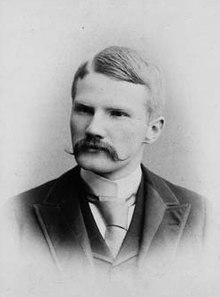Charles Homer Haskins
Charles Homer Haskins (born December 21, 1870 in Meadville (Pennsylvania) , † May 14, 1937 in Cambridge (Massachusetts) ) was an American medievalist and presidential adviser.
Live and act
After attending Allegheny College in his hometown, he studied at Johns Hopkins University in Baltimore and received his bachelor's degree in 1887 . After further studies in Baltimore and at the universities of Paris and Berlin , he became a Ph. D. and lecturer at the Johns Hopkins in 1890 . From 1892 to 1902 he taught as a professor of history at the University of Wisconsin . From 1902 he worked at Harvard University , most recently as Henry Charles Lea Professor of Medieval History . From 1908 to 1924 he was Dean of the Graduate School of Arts and Sciences . In 1931 he retired from active service for health reasons.
The main subjects of his research included the founding of the Norman states in England and Sicily, the Latin translations from Greek and Arabic at the Norman royal court in Palermo and the history of the universities. His idea of the 12th century Renaissance , which he developed from his studies of the translations of ancient authors, had a lasting effect .
Haskins, who is considered one of the first US medievalists, was also active in scientific organizations. From 1920 to 1926 he was the first Chairman of the American Council of Learned Societies , and in 1922 also President of the American Historical Association . He was one of the founders of the Medieval Academy of America , whose second president he was in 1926/1927.
President Woodrow Wilson , whom Haskins had known since his student days, appointed him to his advisory committee "The Inquiry" in 1917, which was to develop concepts for the peace order after the end of the World War . At the Paris Peace Conference , Haskins was head of the section of the US delegation responsible for Western Europe. Together with Robert H. Lord , who headed the department responsible for Eastern Europe, he published a series of lectures in 1920, which described their impressions of the negotiations, under the title Some Problems of the Peace Conference .
His written estate, the Charles Homer Haskins Papers , is available for research in the Princeton University Library. They also contain records of his work at the Paris Peace Conference.
Honors
Numerous European and American universities have awarded Haskins an honorary doctorate. In 1913 he was elected to the American Academy of Arts and Sciences . Since 1921 he was a member of the American Philosophical Society . In 1926 he became a corresponding member of the British Academy .
In May 1982 the Charles Homer Haskins Society for Viking, Anglo-Saxon, Anglo-Norman and Angevin History was founded, with a major contribution from C. Warren Hollister . The Society holds a conference each November at Georgetown University and participates in organizing sections at Medieval Congresses in Kalamazoo and Leeds . She is responsible for the publications of The Haskins Society Journal: Studies in Medieval History and a three-times-a-year newsletter under the title The Anglo-Norman Anonymous .
Since 1983 the American Council of Learned Societies has held the Charles Homer Haskins Prize Lectures under the theme "A Life of Learning" .
In 1986, Johns Hopkins University established the Charles Homer Haskins Chair in History in honor of its graduate .
In his honor, the Medieval Academy of America named its most important prize as the Haskins Medal .
Fonts (selection)
- The Normans in European History , 1915
- Norman Institutions , 1918 as PDF (16.4 MB)
- The Renaissance of the Twelfth Century . Cambridge: Harvard University Press, 1927.
- Studies in History of Medieval Science. Cambridge, Massachusetts: Harvard University Press 1924
literature
- Sally Vaughn: Charles Homer Haskins (1870–1937) , in: Helen Damico, Joseph B. Zavadil (eds.): Medieval Scholarship. Biographical Studies on the Formation of a Discipline, Volume 1: History (= Garland Reference Library of the Humanities, Volume 1350), Garland Publishing, New York 1995, ISBN 0-8240-6894-7 , pp. 169-184.
Web links
- Writings by and about Charles Homer Haskins in the OPAC of the SB Berlin PK
- Homepage of the Haskins Society
- Short biography at the ACLS
- Biography engl.
Individual evidence
- ↑ Information about the Charles Homer Haskins Papers in the Princeton University Library ( Memento of the original from June 6, 2010 in the Internet Archive ) Info: The archive link was inserted automatically and has not yet been checked. Please check the original and archive link according to the instructions and then remove this notice.
- ^ Member History: Charles H. Haskins. American Philosophical Society, accessed September 23, 2018 .
- ^ Deceased Fellows. British Academy, accessed June 8, 2020 .
- ↑ Overview of all articles can be downloaded as PDF.
- ↑ Information from the university, currently Christopher S. Celenza (last accessed on January 15, 2016)
| personal data | |
|---|---|
| SURNAME | Haskins, Charles Homer |
| BRIEF DESCRIPTION | American medievalist |
| DATE OF BIRTH | December 21, 1870 |
| PLACE OF BIRTH | Meadville, Pennsylvania |
| DATE OF DEATH | May 14, 1937 |
| Place of death | Cambridge, Massachusetts |
